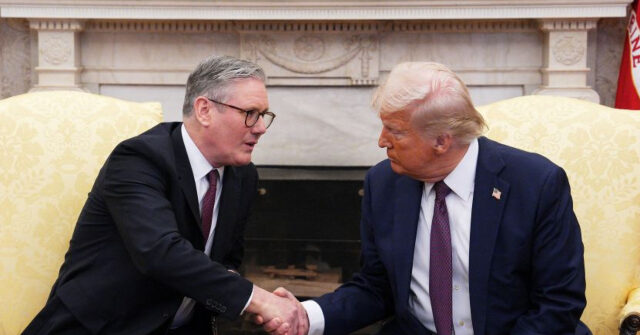The Trump administration has released details on the trade deal the United States has reached with the United Kingdom — the first agreement since Trump implemented his “Liberation Day” tariffs last month.
The agreement between the allies covers products across a wide range of sectors, including agriculture, automobiles, steel, and more.
According to the administration, the agreement opens up $5 billion in new market access for American exporters in the U.K. The ten percent baseline Liberation Day tariff remains in effect, which the White House estimates will generate $6 billion in external revenue.
U.S. products that are gaining “unprecedented access to the U.K. Market” include “ethanol, beef, cereal, fruits, vegetables, animal feed, tobacco, soft drinks, shellfish, textiles, chemicals, machinery, and more,” a chart Trump shared on social media notes.
A White House fact sheet on the deal notes that the $5 billion in added market opportunities for U.S. producers include “more than $700 million in ethanol exports and $250 million in other agricultural products, like beef.”
As part of the deal, the first 100,000 British-made cars imported into the United States annually will face a ten percent tariff. Additional imported cars will be tariffed at 25 percent. Trump notably placed a 25 percent tariff on all foreign-made cars on Liberation Day. The policy has been amended, but the deal with the U.K. grants British automakers some relief compared to other foreign producers.
“And remember, we do 16 million cars a year. So this is only like .6 percent, but for the U.K. auto people, this is tens of thousands of jobs that the president agreed that he would protect for them,” U.S. Commerce Secretary Howard Lutnick said Thursday in the Oval Office.
Lutnick also noted that plane parts like Rolls-Royce engines, which are British-made and used by American company Boeing, will not be tariffed, while a soon-to-be-revealed U.K. airline is set to buy billions worth of Boeing products.
“They sell Rolls-Royce engines to Boeing, we’ve agreed to let Rolls-Royce engines, and those kind of plane parts, to come over tariff-free. And what you’re going to hear today is there’s going to be an announcement in the U.K. that they are buying ten billion dollars worth of Boeing planes later today,” Lutnick said.
“But I’m going to let the name of the airline announce it, because that’s theirs to do, but part of this deal was always to do it together and to do it strong,” he added.
Moreover, Lutnick said the U.K. is going to follow America’s model on steel tariffs and quotas to generate a steel resurgence.
“So the British government, as part of this deal, nationalized British Steel, and they’re going to match the kinds of models we do. They’ll put tariffs on, they’ll put quotas on,” he explained.
“They want to do it with America, so they can be part of the resurgence of steel and aluminum in America, and that saves them again, thousands and thousands of jobs,” Lutnick added.
Trump called the deal a historic step in forging an “economic security alignment” between the countries, which is “the first of its kind.”
“We feel very, very comfortable with that because it’s been a great ally, truly one of our great allies… both countries have agreed that economic security is national security, and will be working together as allies to ensure we have a strong industrial base, appropriate export controls, and protections for key technologies and industries,” he said.
Breitbart News Economics Editor John Carney provided his thoughts on what an “economic security alignment” means.
“The Trump administration has explained many times that ‘economic security is national security.’ What this means is that creating secure supply chains for everything from energy to economically important manufactured goods is central to the preservation of the free world,” he explained. “Bringing the UK into our economic security blanket appears to mean opening the U.K. to U.S. markets in energy, agriculture, and manufacturing so that it is no longer dependent on unstable rivals such as Russia and China for vital goods.”
Read the full article here


